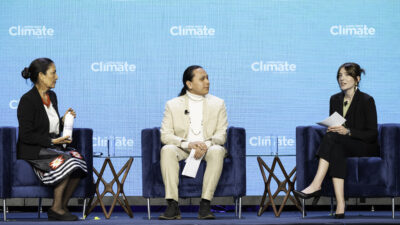
Amidst the urgency of climate change, partnerships provide a platform that allows youth voice and leadership to thrive.
Recently, Talia Davis, a Fresh Tracks NYCALC Trainer, had the opportunity to moderate a fireside chat with Secretary of the Interior, Deb Haaland at Aspen Ideas: Climate in Miami Beach, Florida.
Talia Davis is Tlingit from the village of Kake, Alaska. She is a Fresh Tracks Trainer and a graduate student studying freshwater plankton at Oregon State University. After witnessing how logging affected every aspect of the environment that raised her, Talia was inspired to learn more about Western environmental sciences to supplement the Indigenous Knowledge that she already carries. She attended the University of Alaska Fairbanks and graduated with a Bachelor of Science in Fisheries and Ocean Sciences. After graduating, Talia became a RAY Conservation Diversity Fellow and worked at NOAA Fisheries for two years. Talia believes that stewardship of the air, land, and sea is inherently connected to native people, and that all Indigenous peoples have a right to manage and protect the resources that have supported their people since time immemorial.
Talia’s questions to the Secretary highlighted the invaluable wisdom of Indigenous practices and how they can complement and enhance western scientific approaches. They also advocated for small and remote Indigenous communities’ well-being and impact to be centered in plans for clean energy. You can read Talia’s questions below
Q1: Youth today have the power and opportunity to combine Indigenous Knowledge with western practices to address climate change. What are meaningful ways that youth can collaborate with you and the DOI to change mindsets, culture, and systems?
Q2: For many indigenous communities the cost of energy can be debilitating, especially in rural or off the grid areas. Clean energy efforts seem to target cities, or are only available to those who can afford the newest technologies. How do we advocate for Native communities so that they and the land are benefited and not harmed when it comes to clean energy?
The Secretary’s responses included acknowledging and honoring the Inupiaq people and their traditional knowledge of whales and the environment on the North Slope (Alaska), and highlighting the Department of the Interior’s energy investment on the Hopi reservation in Arizona.
Although the fireside chat was short, Talia’s presence amplifies the importance of partnerships to support youth in creating change. As a Fresh Tracks Trainer, Talia will support other Native youth in developing community climate action at the Native Youth Climate Adaptation Leadership Congress (NYCALC). NYCALC is a federal partnership between the U.S. Fish and Wildlife Service, National Park Service, Bureau of Indian Affairs, U.S. Forest Service, and New Mexico Wildlife Federation.
Fresh Tracks partners with NYCALC to facilitate a leadership pathway for Native, college-aged youth. Fresh Tracks young adult leaders serve as mentors and trainers for this cohort, using the Fresh Tracks toolkit and curriculum that centers healing, community building, and taking action to create change.
Fresh Tracks is proud to be in partnership with the Department of the Interior through our Memorandum of Understanding (MOU) that outlines support for creation of pathways for youth and young adults to take initiative for social and environmental justice. And build capacities for BIPOC youth-centered organizations.
As we celebrate Talia’s on-stage moderation at the Aspen Ideas: Climate, let’s remember the power of partnerships and the impact we can make when we come together. And this applies to everyone: Federal and community organizations, youth and adult allies, programs and philanthropy. We each have a role to play in centering youth and supporting their leadership in making a difference for our climate and environment.
Stay tuned for more updates as we continue our journey to create a brighter, more sustainable future for all.